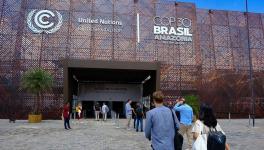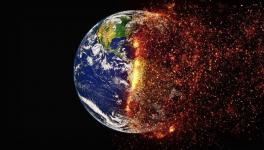Climate Change: A Catalyst for Armed Conflicts?

Image for representational use only.Image Courtesy : europeanscientist.com
Climate change may act like a catalyst for armed conflicts within countries. A latest analysis published in Nature has estimated that climate has influenced between 3% to 20% of armed conflict risks over the last century, which is likely to increase dramatically in the coming period.
If the current policy on climate change is not altered, there will be a 4 degree Celsius rise in temperature and the influence of climate on conflict would increase by more than five times, leading to a substantial increase of chance in conflict by 26%. Even in a scenario where the goals of the Paris Climate Agreement are met, i.e. limiting the warming within 2 degree Celsius beyond pre industrial level, the influence of climate on conflict still lingers with a chance of 13%.
Director of Stanford Environment Assessment Facility and the lead author of the study, Katharine Mach was quoted to have said—“Appreciating the role of climate change and its security impacts is important not only for understanding the social costs of our continuing heat-trapping emissions, but for prioritising responses, which could include aid and cooperation.”
Marshall Burke, another author of the study, puts forward the idea that studying the impact of climate change in increasing conflicts worldwide is not only important to tackle probable future conflicts, but also important for mitigating future climate change.
The gradual extreme weather conditions induced by climate change lead to a decrease in farming and livestock production, damaged economy and slowly intensifying inequalities among social groups. These climate induced factors when combined with already existing drivers of conflict, increase risks of violent conflicts.
Consensus on Climate Induced Conflicts
Relationship between climate and conflict is a contested subject and the research findings on it are also diverse. To get a clearer picture of this relation between climate and conflict, the study adopts an unusual methodology. It involves interviews with and debates among experts in political science, environmental science, economics and other fields who have come to varied conclusions on climate-conflict relation in their past researches. The experts are also co-authors of the study.
Also read: More Commitments Needed to Tackle Climate Change, Warns UN Report
The debates and interviews of the experts agreed to the point that climate has affected organised armed conflicts in recent decades. However, they made it clear that, factors such as low socio-economic development, strength of government, inequalities in societies, and a recent history of violent conflict have a much heavier impact on conflict within countries.
Though the researchers envision climate change induced violent conflicts, it is not fully understood in what exact conditions climate affects conflicts and how. Also, the consequences of future climate changes would be very different from the historical climate disruptions, because humanity is inevitably going to experience climatic conditions that go beyond the known experiences.
"Historically, levels of armed conflict over time have been heavily influenced by shocks to, and changes in, international relations among states and in their domestic political systems. It is quite likely that over this century, unprecedented climate change is going to have significant impacts on both, but it is extremely hard to anticipate whether the political changes related to climate change will have big effects on armed conflict in turn. So I think putting non-trivial weight on significant climate effects on conflict is reasonable”-- said James Fearon, professor of political science and co-author on the study.
Planning for the Future
Planning to tackle the changing climate and reducing conflicts could be a way ahead. The study suggests that adaptation strategies such as crop insurance, post-harvest storage, training services along with other measures can help achieving food security and diversify economic opportunities, ensuring which would reduce the potential of climate-conflict linkages.
Along with it, peacekeeping, conflict mediation and post-conflict aid operations could be helpful in risk reduction strategies as climate hazards may exacerbate violent conflict in the near future.
Also read: Anthropocene: The Human-made Epoch?
Get the latest reports & analysis with people's perspective on Protests, movements & deep analytical videos, discussions of the current affairs in your Telegram app. Subscribe to NewsClick's Telegram channel & get Real-Time updates on stories, as they get published on our website.
























